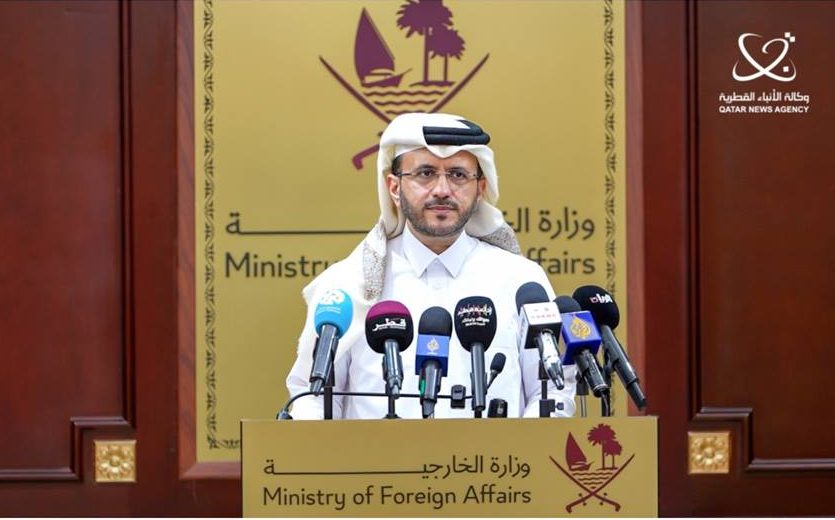The Gulf state has led mediation efforts alongside the U.S. and Egypt since the onset of Israel’s brutal war on the Gaza Strip on October 7, 2023.
Qatar has denied reports claiming it has withdrawn from its vital mediation efforts in Gaza and ordering the closure of Hamas’s office in Doha. The country clarified that while its diplomatic efforts have currently been stalled, it remains committed to supporting peace initiatives in the region.
Reports on Saturday morning by numerous news outlets – including Reuters and AFP – cited officials who pointed to Qatar’s plans to close Hamas’s office and end its crucial mediation efforts.
In 2012, Qatar had agreed to establish the Hamas office based on Washington’s request.
Citing a senior Joe Biden administration official, Reuters reported over the weekend that the United States told Qatar that the presence of Hamas’s office in Doha no longer served its purpose as mediation efforts stalled.
Separately, a diplomatic source told AFP that Qatar planned to withdraw from the talks and close Hamas’s office as it “no longer serves its purpose”. Hamas officials, who remained anonymous, had dismissed the claims in statements to both news agencies.
Hours later, Qatar’s Foreign Ministry Spokesperson Majed Al-Ansari dismissed the reports as “inaccurate”, noting that its mediation stalled until both sides show a willingness to negotiate.
In a statement to Qatar’s news agency (QNA), Al-Ansari explained that Qatar had only notified the parties 10 days ago during the latest attempts to reach a deal that it would stall its efforts if no agreement was reached.
Al-Ansari was referring to the latest round of talks that took place in Doha in late October, which reached no breakthrough.
The Qatari official said that his country will only resume its efforts alongside Egypt and the U.S. if Israel and Hamas “show their willingness and seriousness to end the brutal war” in the Gaza Strip.
“Al-Ansari pointed out that the media reports regarding the Hamas office in Doha is inaccurate, stating that the main goal of the office in Qatar is to be a channel of communication between the concerned parties, and this channel has contributed to achieving a ceasefire in previous stages,” QNA reported.
Al-Ansari reiterated that “Qatar will not accept that mediation be a reason for blackmailing it” and “exploiting the continuation of negotiations to justify the continuation of the war to serve narrow political purposes”.
He also underlined “the need to obtain information from its official sources”.
A year of stalemate
Qatar has led mediation efforts alongside the U.S. and Egypt since the onset of Israel’s brutal war on the Gaza Strip on October 7, 2023.
The negotiations last year culminated in a week-long truce that lasted from November 24 until December 1, before Israel immediately resumed its bombardment of the Gaza Strip.
The truce resulted in the release of 109 captives held by Hamas in exchange for 240 Palestinian prisoners, predominantly women and children. Some of those released have since been re-arrested by Israeli forces, while several others were killed.
Israel has led major escalatory moves since the expiration of the truce, disrupting negotiating efforts as it maintained its refusal of completely ending the war.
On May 6, Israeli occupation forces invaded and destroyed the Egypt-Gaza Rafah Crossing after Hamas notified the mediators about agreeing to a proposed deal from Biden.
In a statement at the time, the office of Israel’s Prime Minister Benjamin Netanyahu claimed the proposal did not meet its demands.
Hamas had sent Qatar and Egypt an amended proposal on July 3, which Israel also rejected.
Israel then assassinated Hamas’s political chief Ismail Haniyeh in Tehran on July 31, although it has yet to publicly admit the killing.
Israel has also expanded its aggression to Lebanon, where it killed Hezbollah Secretary-General Hassan Nasrallah on September 27, before killing Haniyeh’s successor Yahya Sinwar on October 16.
During the genocide, which hit its 400-day mark on Saturday, Israel has killed at least 43,552 people, although the figure is an undercount as thousands remain missing or buried under the rubble.
Meanwhile, the figure in Lebanon has surpassed 3,000, with more than one million people displaced from their homes.







